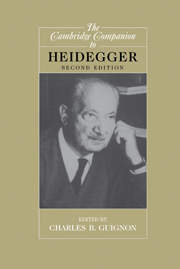Book contents
- Frontmatter
- Introduction
- 1 The question of being: Heidegger’s project
- 2 Reading a life: Heidegger and hard times
- 3 The principle of phenomenology
- 4 Time and phenomenology in Husserl and Heidegger
- 5 Laying the ground for metaphysics: Heidegger’s appropriation of Kant
- 6 Heidegger and the hermeneutic turn
- 7 Engaged agency and background in Heidegger
- 8 Death, time, history: Division II of Being and Time
- 9 Truth and the essence of truth in Heidegger’s thought
- 10 Authenticity, moral values, and psychotherapy
- 11 Heidegger, Buddhism, and deep ecology
- 12 Heidegger and theology
- 13 Heidegger on the connection between nihilism, art, technology, and politics
- 14 The fourfold
- Bibliography
- Index
- Series List
Introduction
Published online by Cambridge University Press: 28 March 2007
- Frontmatter
- Introduction
- 1 The question of being: Heidegger’s project
- 2 Reading a life: Heidegger and hard times
- 3 The principle of phenomenology
- 4 Time and phenomenology in Husserl and Heidegger
- 5 Laying the ground for metaphysics: Heidegger’s appropriation of Kant
- 6 Heidegger and the hermeneutic turn
- 7 Engaged agency and background in Heidegger
- 8 Death, time, history: Division II of Being and Time
- 9 Truth and the essence of truth in Heidegger’s thought
- 10 Authenticity, moral values, and psychotherapy
- 11 Heidegger, Buddhism, and deep ecology
- 12 Heidegger and theology
- 13 Heidegger on the connection between nihilism, art, technology, and politics
- 14 The fourfold
- Bibliography
- Index
- Series List
Summary
As the twenty-first century begins, it is increasingly clear that Heidegger will stand out as one of the greatest philosophers of all times. His writings have had an immense impact not only in Europe and the English-speaking world but in Asia as well. And his influence has been felt in areas as diverse as literary theory, psychoanalysis, rhetoric, ecology, and theology. The continuing explosion of interest in Heidegger has come as a surprise to even his most ardent admirers. In the fifties and sixties it was still possible to consign Heidegger to the “Phenomenology and Existentialism” bin of the philosophy curriculum, treating him as the student of Husserl and precursor of Sartre. His talk about angst, guilt, death, and the need to be authentic seemed to place his work well outside the range of topics making up the mainstream Anglo-American curriculum. Though he was read in France, he was largely ignored in the English-speaking world.
In the past decades, however, a number of events have brought about a wider appreciation of the achievement of this fertile and complex thinker. First, in North America, the writings of such influential figures as Richard Rorty, Charles Taylor, and H. L. Dreyfus have helped us to see Heidegger as the seminal figure in what David Hoy calls a “hermeneutic turn,” a new orientation with profound repercussions for such issues as the nature of the human sciences, the possibility of artificial intelligence, and the prospects for a postfoundationalist culture. As such respected theorists as Clifford Geertz, Thomas Kuhn, Michael Walzer, and Roy Schafer come to describe their approaches as “hermeneutic,” there is a greater tendency to go back to the seminal texts that shaped contemporary hermeneutics.
- Type
- Chapter
- Information
- The Cambridge Companion to Heidegger , pp. 1 - 41Publisher: Cambridge University PressPrint publication year: 2006
- 10
- Cited by



